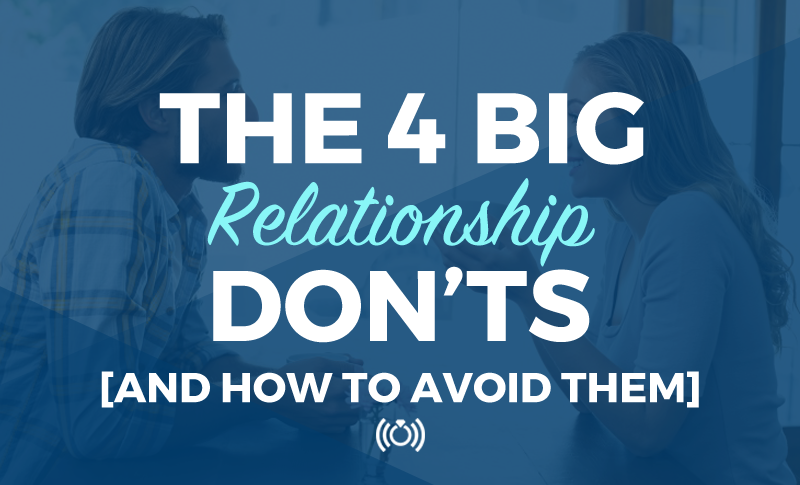Over decades of research, psychologists John and Julie Gottman, found there are four factors that predict relationship failure — Criticism, Contempt, Defensiveness and Stonewalling. Unsurprisingly, these 4 factors all relate to how we treat one another, especially when we don’t see eye to eye. The Gottman’s call these behaviors the Four Horsemen of the Apocalypse because without change, they will undoubtedly lead to the end of your relationship.
Chase and I have shared in the podcast that we’ve struggled with a few of these behaviors in our relationship. I struggle with getting defensive and Chase struggles with control issues. We’ve gotten to a point where we both are aware of these behaviors, but sometimes it’s still hard.
 Growing up I remember my mom telling me, “Practice, Practice, Practice — Practice Makes Perfect.” I would spend hours singing the same song over and over and over in attempts to make it perfect. [And now that I’m a mother, I give my mom some serious props when it comes to patience and not wearing ear plugs.]
Growing up I remember my mom telling me, “Practice, Practice, Practice — Practice Makes Perfect.” I would spend hours singing the same song over and over and over in attempts to make it perfect. [And now that I’m a mother, I give my mom some serious props when it comes to patience and not wearing ear plugs.]
There would be times when I couldn’t hit a certain note, or I would forget the words. Even when the song wasn’t perfect, my mom would be supportive and encouraged me to try again.
Looking back, one thing I’ve learned and come to appreciate is that perfection isn’t always realistic. Songs won’t always be perfect. Life won’t always be perfect. Your relationships won’t always be perfect.
But that doesn’t mean you shouldn’t practice.
So now I want to give you some advice Chase and I try to apply to our relationship — “Practice, Practice, Practice — Practice Makes It Possible.”
So what can you practice in your relationship to avoid the following 4 Big Relationship Don’ts ?
Pay close attention the next time you find yourself engaged in a difficult conversation with your partner. Do any of these behaviors arise in your conversation? If so, try practicing the recommended antidote for each behavior.
Criticism
Research consistently found that it takes four positive comments to recover from one negative comment from a partner. That ratio means that criticism is a highly ineffective way of communicating in your relationship with your partner. Criticism attacks the character of your partner and usually makes them feel assaulted, rejected and hurt.
- Criticism: “You never think about how your behavior is affecting other people. I don’t believe you are that forgetful, you’re just selfish! You never think of others! You never think of me!”
Instead of focusing on a specific behavior, try talking about your feelings using “I” statements.
- Complaint: “I was scared when you were running late and didn’t call me. I thought we had agreed that we would do that for each other.”
For more examples of “I” statements that you can use in your relationship, download the free guide.
If you find that you and your partner are critical of each other, don’t assume your relationship is doomed to fail. However, keep in mind that if criticism is pervasive it can pave the way for the more deadlier horsemen below.
Contempt
Contempt is the greatest predictor of relationship failure and must be eliminated. Contempt encompasses behaviors and words that lets a person know you don’t like or approve of them. Content is an expression of superiority that comes out as sarcasm, cynicism, name-calling, eye rolling, sneering or mockery.
Here is an example of contempt in a relationship from the Gottman Institute’s website:
“You’re ‘tired?’ Cry me a river. I’ve been with the kids all day, running around like mad to keep this house going and all you do when you come home from work is flop down on that sofa like a child and play those idiotic computer games. I don’t have time to deal with another kid – try to be more pathetic…”
Instead, try treating one another with respect by building a culture of respect in the relationship.
If you need some help building respect in your relationship, download our free guide on How to Cultivate Respect In Your Relationship. You can also listen to our interview on respect with John Kim here.
Defensiveness
The third factor that leads to a relationship disaster is defensiveness. You can’t listen and get on the same team with your partner when you’re planning your next offense. When we feel accused unjustly, we fish for excuses so that our partner will back off. Unfortunately, this strategy is almost never successful. Defensiveness never solves the problem and it’s usually a covert way of blaming your partner.
Instead of getting defensive, try accepting responsibility, even if it’s for only part of the conflict.
- She: “Did you call Betty and Ralph to let them know that we’re not coming tonight as you promised this morning?”
- He: “I was just too darn busy today. As a matter of fact you know just how busy my schedule was. Why didn’t you just do it?”
Not only did he respond defensively, but turns the table and makes it her fault. A non-defensive response would have been:
“Oops, I forgot. I should have asked you this morning to do it because I knew my day would be packed. Let me call them right now.”
Stonewalling 
Instead of confronting an issue with their partner, Stonewalling occurs when the listener withdraws from the conversation and closes himself/herself off from their partner. Stonewalling usually doesn’t happen immediately in a relationship, as it can take time for the negativity created in by the first three horsemen to result in stonewalling. However, once it starts, stonewalling can become a bad habit.
If you or your partner closes off or breaks down, take a break for at least 20 minutes. Calm down, and then return to the conversation.
If you need help managing conflict in your relationship, download our free Step by Step Guide to Help Couples Manage Conflict. You can also listen to our interview on managing conflict with Dr. Bernard Golden here.
Awareness of these behaviors is the first step in eliminating them. Try practicing replacing any destructive or negative communication patterns with the healthy productive examples listed above or in our free guides below:
Using “I” Statements
How To Cultivate Respect In Your Relationship
Step By Step Guide To Help Couples Manage Conflict

